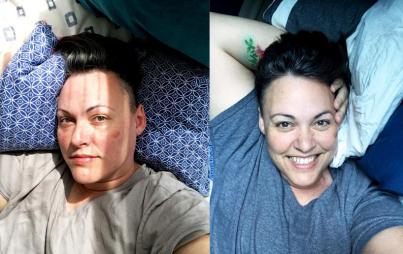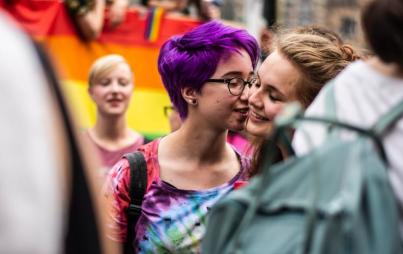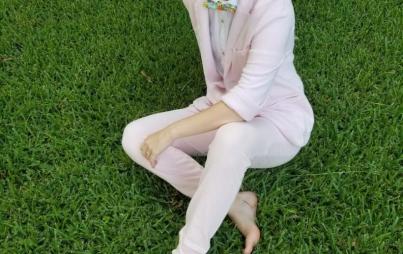
José de Ribera courtesy: Wikimedia
“Well, then I guess there’s no God.”
I decide this as I walk home from my best friend Anabelle’s house in the suburbs of Ottawa. I’ve just told her about my first consensual blowjob, with a boy named Julius. After he came in my mouth, I spat it out and said, “No offense.” He laughed. I tell her that part too; how I was accidentally funny. She looks down at the ground under the swings in the empty playground where we’re slowly swaying, her perfectly-highlighted strawberry blond waves hanging around her face and says, “I didn’t think you were that kind of girl.” Oh. Shit. Maybe not so funny? Hot shame rushes across my face, the shame that accompanies every waking moment of being a 15-year-old girl.
On my walk home I think about what kind of girl I am. I think about how Anabelle seemed to believe that sex was wrong for girls like us — and how just about everyone agreed, even the Bible. But I am that kind of girl. And somehow, deep inside — in a place that has survived the shame that sets my life on fire every day — I know that they are all just full of shit. I just know that sex is OK, even for girls. And if God and the Bible don’t know that, well then God and the Bible are full of shit, too. I choose blowjobs and joking with boys about their cum over a god that would hate girls like me.
Fifteen years later, on a bright August afternoon, I’m sitting at a Prisoners’ Justice Day vigil at the Don Jail in Toronto. I’ve been going to protests and vigils and actions for years. This one, though, was the first time I’d ever seen a preacher speak: a tall, thin Black man with warm eyes and a white collar. He stands on a little patch of grass and motions to the jail behind him as he says, “The lives of people locked up matter because all lives deserve dignity. All life is divine.”
I feel something old crack and move in my chest.
I’d only even gone to the event because I was hoping to see an ex-girlfriend whom I’d broken up with in the spring. Our short romance ended when I slammed the phone down on her after she stood me up for the last time — but, fuck, I still missed her. And now here I was on this little patch of grass outside the city jail trying to look unaffected while my eyes welled up.
Quiet down now, heart.
But whatever steel wall I’d erected at 15 to protect my slutty queer self from God’s Army of Slut-Shamers started to crack. Here now was a different kind of God, a god that apparently saw the value in us all and had bigger things to worry about than what I did in bed. Still....
“I am an atheist,” I reminded myself as I left the vigil, a little horrified and angry at my tears. I held my head high, my kitten heels digging into the grass, so the ex would fully understand that any tears I had were not for her.
I didn’t give it much more thought until a few years later. I was in Laos, sitting in the passenger seat of a Jeep, barreling down a gravel road, windows open and dust blowing in my hair. I was living in Thailand working with a sex workers’ organization and needed to renew my visa, so I popped across the border to Laos, figuring I’d see some of the country before returning to Bangkok. I stayed with a friendly Australian ex-pat who kept his lechery limited to discreetly glancing at my tits when he thought I wasn’t looking. He put me up on his couch and offered to show me around.
So that’s how I came to be driving through the rural roads of southern Laos in his Jeep with a small piece of bamboo in my hand. We bumped and shook over the rough roads and waved back at the kids in school uniforms piled into the back of a truck ahead of us. It had been months since I’d seen any of my too-radical-for-religion friends. I looked down at the bamboo, noticed its minute and exquisite symmetry and thought: God.
That night, alone in my bungalow room near the border, I looked at the book I was carrying. Good God, could I have been any more earnest? It was Wayne Dyer’s Your Sacred Self. “I’m not religious,” I’d reassured myself when I bought it at the second-hand bookshop in Vientiane, “I’m just curious.”
Looking at the dorky yellow cover of that book, remembering the years I spent in cathedrals (“I just find them comforting!”), and my original college major (religious studies) I realized two things: First, that I was a Christian and had been circling it for years, holding tight to my threads of denial as the evidence mounted.
Second, that I was a white woman from the Global North having a spiritual awakening in the Global South. The horror: I was Elizabeth Gilbert in Eat, Pray, Love. I’m an intersectional activist and an abortion-loving queer lady of the night. Surely, if God had any mercy, she would make me anyone but Elizabeth Gilbert discovering anything but her Christianity. In a Buddhist country colonized by a Christian one, no less, all of this having started while listening to a Black Christian preacher whose faith communities were born in resistance to genocide and Whiteness.
I whipped my copy of Your Sacred Self across the room in a rage, crying as it smashed into the wall. I didn’t know what was more humiliating: being in my own personal Eat, Pray, Love or that I had been heading toward it for years and didn’t know it.








